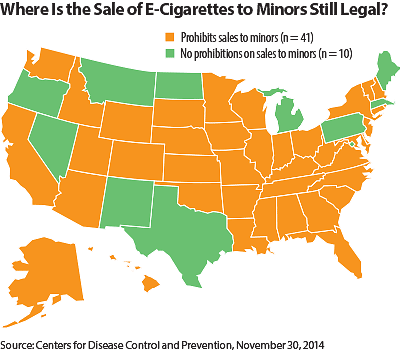More Than 16 Million Youth Can Legally Buy Electronic Cigarettes
Abstract
Approximately 95 percent of the U.S. population can be involuntarily exposed to smoke from cigarettes and other smoked tobacco products—such as electronic delivery nicotine systems.
A new federal report shows that millions of children in the United States can legally buy electronic cigarettes (e-cigarettes) for recreational use.
The Centers for Disease Control and Prevention (CDC) conducted an assessment of state laws regulating the sale and use of electronic nicotine delivery systems (ENDS) to minors and in indoor public areas.

“While ENDS may have the potential to benefit established adult smokers if used as a complete substitute for all smoked tobacco products,” said Tim McAfee, M.D., M.P.H., director of the Office on Smoking and Health at the CDC, “ENDS should not be used by youth and adult non–tobacco users because of the harmful effects of nicotine and other risk exposures, as well as the risk for progression to other forms of tobacco use.”
ENDS are defined as any battery-powered devices capable of delivering aerosolized nicotine and additives to users. Devices include e-cigarettes, electronic hookahs, electronic cigars, and vape pens. Over the past year, ENDS have received much attention—from studies showing that use of nicotine vaporizing gadgets is a potential gateway to regular cigarettes in teenagers (Psychiatric News, April 18, 2014) to the Food and Drug Administration (FDA) proposing a rule to regulate “additional tobacco-related products” (Psychiatric News, June 6, 2014).
In the recent report on ENDS from the CDC, data on state laws enacted as of November 30, 2014, were obtained from the CDC’s State Tobacco Activities Tracking and Evaluation System for all 50 states and the District of Columbia. Laws that prohibited sales of ENDS to minors and use of the products in indoor areas of restaurants, bars, and private-sector worksites were examined.
The results, published in Morbidity and Mortality Weekly Report, showed that 40 states have enacted laws prohibiting the sale of ENDS to minors, and 10 states and the District of Columbia still permit such sales. That means that more than 16 million U.S. children are not covered by these laws.
In addition, the analysis showed that while 26 states and the District of Columbia have smoke-free laws that prevent tobacco smoking in restaurants, worksites, and bars, only three of those states prohibited use of ENDS indoors: New Jersey, North Dakota, and Utah. “Therefore more than 300 million Americans, including 70 million children, live in states in which non-users of these products can be involuntarily exposed to either secondhand smoke from cigarettes and other smoked tobacco products or ENDS aerosol,” the study authors noted. Since 2012, no states have enacted smoke-free laws or laws prohibiting indoor use of ENDS.
“ENDS aerosol is not harmless water vapor,” said Brian King, Ph.D., senior scientific advisor of the Office on Smoking and Health at the CDC, in a press statement. “It can contain nicotine and other toxins. Exposure to nicotine can harm adolescent brain development and can be toxic to fetuses.”
“Yes, e-cigarettes and other nicotine delivery systems could pose a problem,” Eric Kandel, M.D., a Nobel Prize–winning psychiatrist and a professor of neuroscience at Columbia University, said in an interview with Psychiatric News. “There is concern that use of e-cigarettes will lead to initiation of combustible cigarettes in youth. The data confirming this theory is currently lacking.” Kandel stated that although there are not enough data to confirm or disconfirm the safety of ENDS, sales of such products to youth should be prohibited to prevent potential undermining of public-health efforts to reduce tobacco use. Kandel and his wife, Denise Kandel, Ph.D., a professor in psychiatry at Mailman School of Public Health at Columbia University, are conducting studies on the underlying molecular factors of nicotine addiction.
Although e-cigarettes have been marketed as smoking-cessation aids, there is no conclusive scientific evidence that e-cigarettes promote successful long-term cessation of smoking. However, the CDC noted, there are proven adult cessation strategies and treatments, including counseling and FDA-approved cessation medications. ■



